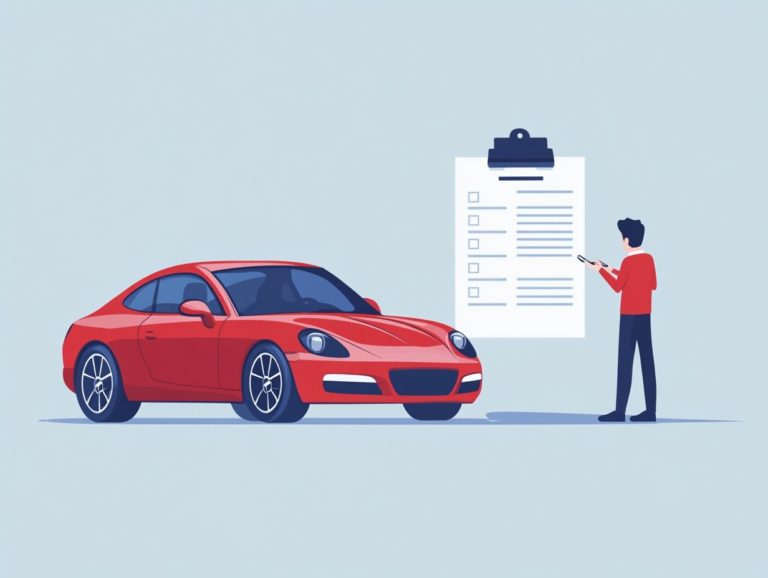New Car Buying Process: A Step-by-Step Guide
Purchasing a new car can be nothing short of exhilarating. However, the experience often feels like stepping into a whirlwind.
From setting your budget to negotiating that final deal, every step is essential for ensuring you make a wise investment. This guide streamlines the journey for you, breaking it into manageable steps that will empower you to assess your finances, research various models, explore financing options, and much more.
Whether you’re a first-time buyer or a seasoned expert, these insights will equip you to navigate the car-buying process with absolute confidence.
Contents
- Key Takeaways:
- Step 1: Determine Your Budget
- Step 2: Research and Compare Car Models
- Step 3: Consider Financing Options
- Step 4: Test Drive and Inspect Potential Cars
- Step 5: Negotiate and Finalize the Deal
- Frequently Asked Questions
- What is the first step in the new car buying process?
- Should I get pre-approved for a car loan before starting the buying process?
- How important is test driving a car before making a purchase?
- What factors should I consider when choosing a new car?
- Do I need to purchase additional warranties or protection plans when buying a new car?
- Can I negotiate the price of a new car?
Key Takeaways:

- Determine your budget and stick to it by assessing your finances and setting a realistic budget range.
- Research and compare car models to identify your needs and preferences. Find the best features and prices.
- Consider financing options and calculate monthly payments before making a decision. Test drive and inspect potential cars, negotiate for a good price, and finalize the deal with proper paperwork.
Step 1: Determine Your Budget
Setting a budget is the first step in buying a car. It helps you understand how much you can spend and all the costs involved. Whether you’re navigating this process for the first time or are a seasoned car buyer, having tips for first-time new car buyers will enable you to make informed decisions about your purchase options.
This involves assessing dealership financing, interest rates, and monthly payments.
Make sure you stay comfortably within your financial range.
Assessing Your Finances
Assessing your finances is crucial when you’re gearing up to buy a new car. It s not just about picking a shiny model; it s about grasping the nuances of your credit score, exploring available auto loan options, and evaluating the potential trade-in value of your current vehicle.
Check your credit history. It helps you negotiate better financing terms, and it can significantly influence the interest rates you’ll encounter. It’s wise to obtain a copy of your credit report and examine it closely for any errors, as these missteps could adversely affect your credit score.
Determining the trade-in value of your vehicle is essential, as it can lower the overall cost of your new purchase. Whether you choose to make a cash payment or explore financing options, each route has its own benefits. Paying in cash could help you avoid interest costs and streamline the buying experience. Financing might keep your cash flow intact and facilitate easier budgeting.
Step 2: Research and Compare Car Models
Researching and comparing car models is a thrilling part of your journey! This process allows you to evaluate different automotive manufacturers, grasp their reliability ratings, and uncover key features that cater to your specific needs and preferences.
Identifying Your Needs and Preferences
Identifying your needs and preferences as a car buyer is essential when selecting the right vehicle. This process ensures that the car you choose aligns perfectly with your lifestyle, usage requirements, and future vehicle registration considerations. For first-time buyers, your guide to car financing can provide valuable insights into making informed decisions.
You ll encounter various types of car buyers. Families often require ample space and robust safety features, while young professionals typically seek fuel efficiency and seamless technology integration. Some may lean toward luxurious details or high-performance capabilities, whereas others might prioritize budget-friendly options with reliable maintenance records.
Understanding your preferences is crucial. Choosing a vehicle that balances essential features like advanced safety technology, generous storage space, and connectivity options is the key to long-term satisfaction. As you navigate the intricacies of vehicle registration, consider how specific features can impact your insurance rates and overall ownership costs.
Comparing Features and Prices

Comparing features and prices is essential for you as a car buyer. This process helps you quickly spot the best deals available!
By evaluating the price suggested by the manufacturer against the available inventory, you can pinpoint the best deal in your area.
Delving into the various pricing strategies from different dealerships can enhance your buying experience. Don t forget to consider financing options, including interest rates and loan terms, to understand their impact on your overall costs.
Hidden fees, maintenance packages, and warranty costs can significantly influence the total price. By carefully examining these factors, you can make informed decisions that align with your budget.
This ensures you secure not just a vehicle, but a purchase that maximizes value while minimizing unexpected expenses.
Step 3: Consider Financing Options
Financing options are crucial when buying a car. They affect your monthly payments and overall budget.
Explore Financing Options
Understanding different financing methods is vital for you as a car buyer. It reveals how your financial standing influences loan terms and the availability of preapproval offers.
Explore various options, such as traditional loans, leasing, or dealer financing. Customizing your approach based on your preferred repayment structures can give you more financial flexibility.
Preapproval offers become a significant advantage, enabling you to estimate your budget. This streamlines your car shopping experience.
Navigating the complexities of interest rates and down payments is crucial for establishing a solid financial foundation. Remember, a strong credit score often leads to more competitive rates.
Calculating Monthly Payments
Calculating your monthly payments is crucial for grasping your auto financing obligations. It enables you to account for interest rates and predict the long-term financial implications of your car purchase.
By leveraging an auto loan calculator, you can effortlessly input the loan amount, interest rate, and term duration. This helps gauge your monthly expenses.
For example, consider a $20,000 loan with a 5% interest rate over five years. The calculator offers valuable insights into your estimated monthly payment.
Tweaking these variables can greatly influence your overall costs. Explore various scenarios to select a financing plan that alleviates any future payment anxiety.
Step 4: Test Drive and Inspect Potential Cars
Test driving and inspecting potential cars is essential for you as a car buyer. This process enables you to evaluate performance and assess comfort.
Make sure the vehicle aligns with your expectations regarding reliability and maintenance requirements. Taking the time to engage in these evaluations will lead to greater satisfaction with your choice.
Evaluating Performance and Condition

Evaluating the performance and condition of a vehicle during a test drive is crucial. It allows you to pinpoint any potential issues that could affect your car ownership experience.
As you undertake this assessment, pay close attention to how the car navigates various road conditions. Notice if it responds smoothly to turns and if the steering feels both responsive and precise.
Testing the brakes under different scenarios is essential. Ensure the system engages promptly and that the vehicle comes to a controlled stop.
Comfort is key make sure the seats provide adequate support and that road noise doesn t intrude too much into the cabin.
These factors shape your day-to-day driving enjoyment and influence long-term vehicle value and insurance considerations.
Step 5: Negotiate and Finalize the Deal
Negotiating and finalizing the deal marks the pinnacle of your car buying journey. At this stage, understanding the details of the negotiation process is essential for securing the best possible price and optimal purchase options.
Tips for Negotiating a Good Price
To negotiate a good price, familiarize yourself with the market value the average price cars are sold for in your area. Develop effective negotiation tactics to assist you in discussions with dealership staff.
Knowing current market trends helps you gain invaluable insights into similar vehicles’ selling prices in your area. By conducting thorough research beforehand, you ll be stronger when articulating your offer and presenting a compelling case to the dealer. Be mentally prepared to walk away from the deal if the terms aren t favorable; this stance boosts your confidence and encourages dealers to reconsider their offers.
Gaining insight into dealership incentives, such as manufacturer rebates or special financing rates, can enhance your negotiating strength and help ensure a favorable outcome.
Finalizing Paperwork and Purchase
Finalizing the paperwork and the purchase is crucial. Review the vehicle title, ensure warranty coverage, and understand the financing costs the total amount you pay when borrowing money to buy the car before you drive off in your new car.
This phase is instrumental in establishing a solid foundation for your ownership. It allows you to clarify any uncertainties regarding the terms laid out in your financing agreements. It s not just about crunching numbers; understanding the warranty details can protect you from future repair costs and bring you peace of mind.
By meticulously examining each document, you can avoid unexpected surprises and ensure that all stipulations are met to your satisfaction. Securing comprehensive warranty coverage and verifying the accuracy of the vehicle title are vital details that enhance your overall buying experience.
Frequently Asked Questions
Here are some common questions regarding the car buying process:
What is the first step in the new car buying process?

The first step is to research and determine your budget. This helps narrow down your options and ensures you don’t overspend on a car.
Should I get pre-approved for a car loan before starting the buying process?
It is highly recommended to get pre-approved for a car loan before starting the buying process. This gives you a better idea of your budget and helps you negotiate a better deal with the dealership.
How important is test driving a car before making a purchase?
Test driving a car is extremely important before making a purchase. It allows you to feel the car’s handling, comfort, and features to ensure it meets your needs and preferences.
What factors should I consider when choosing a new car?
When choosing a new car, consider factors such as your budget, the car’s safety ratings, fuel efficiency, features, and your personal preferences and needs.
Do I need to purchase additional warranties or protection plans when buying a new car?
It is not necessary to purchase additional warranties or protection plans, but they can provide added peace of mind. Be sure to carefully review and understand the terms and coverage before making a decision.
Can I negotiate the price of a new car?
Yes, you can negotiate the price of a new car. Research the average market price for the car you want and be prepared to walk away if the dealership is not willing to negotiate a fair price.






